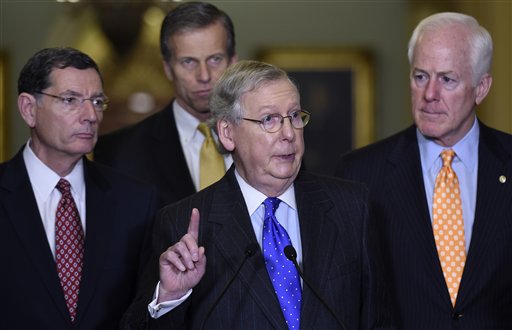WASHINGTON (AP) — Congress and the White House stood on the cusp Tuesday of clinching a year-end tax and spending package that would fund the government through 2016, raise domestic and defense spending, and increase the deficit by hundreds of billions of dollars by extending numerous popular tax credits without paying for them.
Eleventh-hour negotiations twisted and turned on the mammoth deal pairing the $1.1 trillion spending legislation with a giant tax bill catering to any number of special interests. The deal, Congress’ last major piece of unfinished business for the year, became the vehicle for countless long-sought priorities and odds and ends, including bankruptcy protection for Puerto Rico, reform of visa-free travel to the U.S., renewable energy tax credits and health benefits for 9/11 first responders.
Republican leaders predicted the legislation would be unveiled by day’s end and come to a vote Thursday, allowing lawmakers to head home for the holidays having completed their needed tasks, if not distinguished themselves much beyond that. First they would have to pass yet another short-term government funding extension, since the current one runs out Wednesday at midnight.
“In negotiations like this you win some, you lose some. Democrats won some, they lost some. We won some, we lost some,” new House Speaker Paul Ryan, R-Wis., said at an event hosted by Politico. “At the end of the day we’re going to get this done.”
Senate Minority Leader Harry Reid, D-Nev., seeking to maintain leverage, repeatedly cautioned that critical details remained unresolved, warning at one point, “At this pace, we’re going to be here through Christmas.”
It was perhaps an empty threat with lawmakers of both parties eager to get out of Washington. But it underscored the degree to which Democrats, despite their minority party status in Congress, have been able to exact a price in the negotiations, thanks to President Barack Obama’s veto pen and Republicans’ need for Democratic votes on the spending bill.
“We may not be in the majority but we’re feeling that these goals are on track,” boasted Sen. Chuck Schumer, D-N.Y.
Last-stage negotiations focused on horse trading around Democratic demands in exchange for lifting the 40-year-old ban on exporting crude oil, a Republican goal. Democrats were aiming to kill GOP attempts to roll back Obama environmental regulations, and also sought five-year extensions of wind and solar tax credits. A provision related to money to clean up oceans emerged as a sticking point at the last minute.
Democrats sought to extend the child tax credit, opposing GOP demands for Social Security numbers for participants, which Democrats said could exclude the children of immigrants in this country illegally.
From the White House, press secretary Josh Earnest sounded resigned to Obama signing a bill lifting the crude oil export ban despite previous threats to veto the measure as stand-alone legislation. The export ban was imposed during energy shortages of the 1970s but has been declared outdated by industry allies, though environmentalists say lifting it would amount to a giant windfall for the oil industry.
“I’m confident that there will be things that will be included in the omnibus bill that we don’t support,” Earnest said. “I don’t know if the lifting of the export ban will be among them, but our position on this is pretty clear.”
The final package is expected to ignore conservative demands for language clamping down on Syrian refugees entering the U.S. Instead it would contain changes tightening up the “visa waiver” program that allows visa-free travel to the U.S. for citizens of 38 countries, including France and Belgium, where many of last month’s Paris attackers were from.
Also in play were about 50 lapsed and expiring business and individual tax breaks that the two sides were looking to extend, in some cases permanently. The price tag could mushroom to several hundred billion dollars or more over a decade, which would further add to federal deficits. The two sides were working to make some expiring business tax credits permanent in exchange for doing the same to tax breaks for children, college students and lower-earning families.
Senate Majority Leader Mitch McConnell, R-Ky., said such a deal would make a larger tax reform package easier to achieve next year, while satisfying business goals, including extending a research and development tax credit and a popular deduction for equipment purchases.
“Making those permanent is, I think, an important shot in the arm to our economy,” McConnell said at the Politico event.
___=
Associated Press writers Alan Fram, Andrew Taylor, Mary Clare Jalonick and Darlene Superville contributed to this report.
Copyright 2015 The Associated Press. All rights reserved. This material may not be published, broadcast, rewritten or redistributed.









